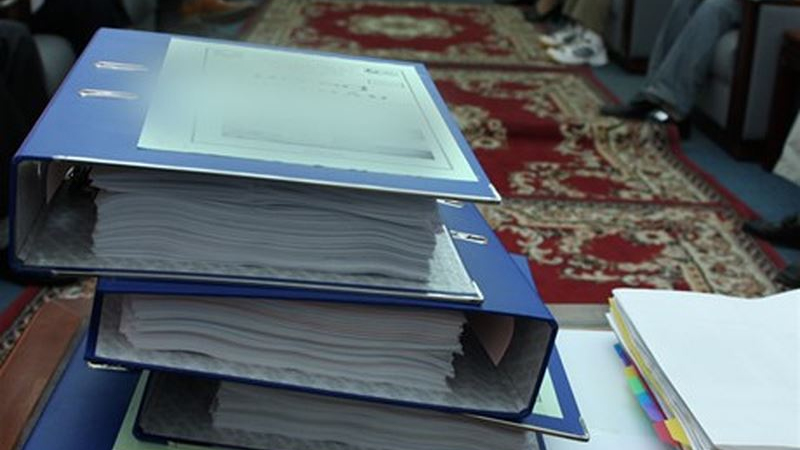Signing the contract
Here is some information you need to know about the transfer of shares based on the Enterprise Law of Vietnam.
1 What is a share transfer? What are the conditions for transferring?
Share transfer is the transfer of share ownership in a joint-stock company from old shareholders to new ones. Share transfers are only carried out if the conditions specified by law are met, except for cases stipulated in Clause 3, Article 119 and Clause 1, Article 126 of the 2014 Enterprise Law.
Conditions for share transfer:
– Point D, Clause 1, Article 127 of the 2020 Enterprise Law stipulates the conditions:
Shares can be freely transferred, except for cases stipulated in Clause 3, Article 120 of this Law and the company’s charter, which restricts share transfers.
In case the company’s charter stipulates restrictions on share transfers, these provisions shall only take effect when clearly stated on the corresponding share certificates.
 Discussing conditions
Discussing conditions
– Clause 3, Article 120 of the 2020 Enterprise Law stipulates the conditions:
Within 03 years from the date the company is granted the Enterprise Registration Certificate, founding shareholders have the right to freely transfer their shares to other founding shareholders and can only transfer common shares to non-founding shareholders with the approval of the General Meeting of Shareholders.
In this case, the transferring shareholder does not have the right to vote on the transfer of those shares.
2 Share transfer procedure
According to Decree 108/2018/ND-CP, shareholders only need to carry out internal transfer procedures and do not need to carry out procedures to change the enterprise registration content at the Business Registration Department – Department of Planning and Investment.
The share transfer procedure includes the following steps:
– Minutes of the General Meeting of Shareholders;
– Decision of the General Meeting of Shareholders;
– Share transfer contract;
– Share transfer contract settlement minutes;
– Submit personal income tax declaration and pay personal income tax arising from share transfer at the enterprise tax management agency (Tax Department or Tax Sub-department).
Deadline for tax declaration:
– If the transferring individual directly submits the declaration: within 10 days from the date of signing the share transfer contract.
– If the declaration is made through the enterprise: before the new business registration certificate is granted.
 Reviewing documents
Reviewing documents
Submit personal income tax declaration:
– Minutes of the General Meeting of Shareholders;
– Decision of the General Meeting of Shareholders;
– Share transfer contract;
– Share transfer contract settlement minutes;
– Submit personal income tax declaration and pay personal income tax arising from share transfer at the enterprise tax management agency (Tax Department or Tax Sub-department).
The share transfer procedure will be carried out in the following steps:
Step 1: Individuals or organizations prepare the share transfer dossier.
Step 2: Shareholders sign a share transfer contract as agreed by the parties.
Step 3: Individuals or organizations submit the share transfer dossier to the Business Registration Office.
Step 4: The Business Registration Office checks the legality and resolves the enterprise’s share transfer dossier.
Step 5: The Business Registration Office sends a notice of the result of the share transfer dossier to the enterprise.
3 What is included in the share transfer dossier?
The dossier includes the following documents:
 Documents
Documents
– Decision of the General Meeting of Shareholders on share transfer;
– Minutes of the General Meeting of Shareholders on share transfer;
– List of founding shareholders of the joint-stock company;
– Company charter (amended and supplemented);
– Share transfer contract;
– Share transfer contract settlement minutes;
– Share certificates of the company’s shareholders;
– Shareholder register.
4 Regulations on share transfer procedures
According to Clause 1, Article 127 of the 2020 Enterprise Law: “Shares can be freely transferred, except for cases stipulated in Clause 3, Article 120 of this Law and the company’s charter, which restricts share transfers.
In case the company’s charter stipulates restrictions on share transfers, these provisions shall only take effect when clearly stated on the corresponding share certificates.”
 Shareholder meeting
Shareholder meeting
Clause 3, Article 120 of the 2020 Enterprise Law stipulates the transfer of shares of founding shareholders of newly operating companies as follows: “Within 03 years from the date the company is granted the Enterprise Registration Certificate, founding shareholders have the right to freely transfer their shares to other founding shareholders and can only transfer common shares to non-founding shareholders with the approval of the General Meeting of Shareholders. In this case, the transferring shareholder does not have the right to vote on the transfer of those shares.”
5 Notes on share transfer
Free transfer of shares: Shareholders have the right to freely transfer their shares to others. Within 03 years from the date the company is granted the Enterprise Registration Certificate, founding shareholders have the right to freely transfer their shares to other founding shareholders and can only transfer common shares to non-founding shareholders with the approval of the General Meeting of Shareholders.
Restrictions on the transfer of common shares of founding shareholders are removed after 03 years from the date of issuance of the Enterprise Registration Certificate.
If the company’s charter has provisions on transfer restrictions, they must comply with the charter’s provisions. Note that these provisions shall only take effect when clearly stated on the corresponding share certificates.
 Handshake after signing the contract
Handshake after signing the contract
Transfer method: Share transfers are made by ordinary contracts or through transactions on the stock market.
In case of transfer by contract, the transfer documents must be signed by the transferor and the transferee or their authorized representative.
In case of transfer through transactions on the stock market, the order, procedures, and recognition of ownership shall be carried out in accordance with the law on securities.
 Share transfer ceremony
Share transfer ceremony
Other notes: If a shareholder who is an individual dies, the heir according to the will or by law of that shareholder shall be a shareholder of the company. If the shares of a shareholder who is an individual die without an heir, the heir refuses to inherit or is deprived of the right to inherit, the number of shares shall be resolved in accordance with the civil law.
Shareholders have the right to donate a part or all of their shares in the company to others; use shares to pay off debts. In this case, the person who receives the donation or pays off the debt with shares will become a shareholder of the company.
If a shareholder transfers a number of shares, the old share certificates shall be canceled, and the company shall issue new share certificates recognizing the transferred shares and the remaining shares.
The recipient of shares in the above cases shall only become a shareholder of the company from the time their information is fully recorded in the shareholder register.
If a shareholder transfers his shares during the period between the end of the shareholder list establishment period and the dividend payment date, the transferor shall be the person who receives the dividend from the company.
Transfer fees and how to calculate transfer fees
According to Clause 2, Article 11 of Circular No. 111/2013/TT-BTC, there are 2 ways to calculate share transfer tax as follows:
Method 1: The individual has registered for tax, has a tax code when making the tax finalization procedure, and can determine the taxable income of each type of securities. Then, pay tax according to the tax rate of 20%.
Personal income tax on share transfers (PIT) in this case will be calculated using the following formula:
PIT = 20% x (Taxable income) = 20% x (Transfer price – purchase price – reasonable expenses related to the transfer)
Where:
Purchase price = Total average price of each type of securities sold in the period.
 Calculating fees
Calculating fees
Method 2: Individuals transferring shares pay tax according to the tax rate of 0.1% of the transfer price of securities each time. Accordingly, PIT is calculated using the following formula:
PIT = 0.1% x Transfer price of securities each time.
According to Article 11 of Circular 111/2013/TT-BTC, personal income tax on share transfers in this case will be calculated according to the following formula:
PIT = Taxable income x 20%
This is what you should know. If you are planning to transfer shares, you can refer to this information. Hopefully, this will be helpful to you.































